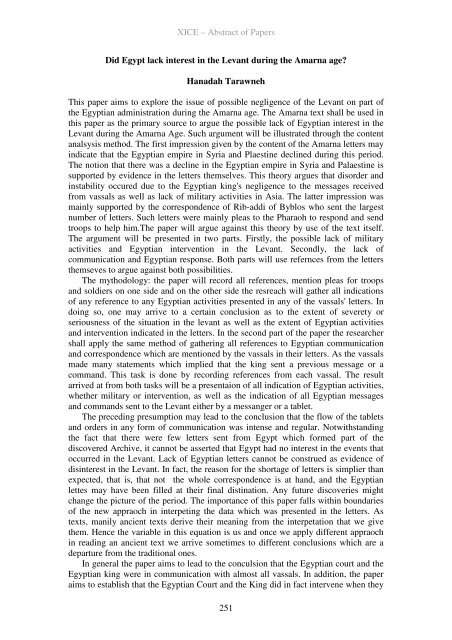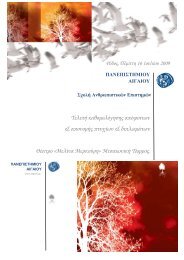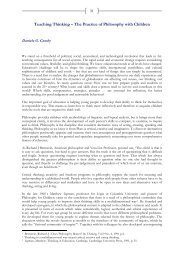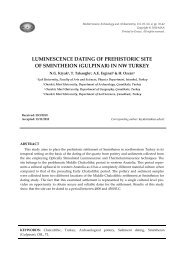Tenth International Congress of Egyptologists Abstracts of Papers
Tenth International Congress of Egyptologists Abstracts of Papers
Tenth International Congress of Egyptologists Abstracts of Papers
You also want an ePaper? Increase the reach of your titles
YUMPU automatically turns print PDFs into web optimized ePapers that Google loves.
XICE – Abstract <strong>of</strong> <strong>Papers</strong><br />
Did Egypt lack interest in the Levant during the Amarna age?<br />
Hanadah Tarawneh<br />
This paper aims to explore the issue <strong>of</strong> possible negligence <strong>of</strong> the Levant on part <strong>of</strong><br />
the Egyptian administration during the Amarna age. The Amarna text shall be used in<br />
this paper as the primary source to argue the possible lack <strong>of</strong> Egyptian interest in the<br />
Levant during the Amarna Age. Such argument will be illustrated through the content<br />
analsysis method. The first impression given by the content <strong>of</strong> the Amarna letters may<br />
indicate that the Egyptian empire in Syria and Plaestine declined during this period.<br />
The notion that there was a decline in the Egyptian empire in Syria and Palaestine is<br />
supported by evidence in the letters themselves. This theory argues that disorder and<br />
instability occured due to the Egyptian king's negligence to the messages received<br />
from vassals as well as lack <strong>of</strong> military activities in Asia. The latter impression was<br />
mainly supported by the correspondence <strong>of</strong> Rib-addi <strong>of</strong> Byblos who sent the largest<br />
number <strong>of</strong> letters. Such letters were mainly pleas to the Pharaoh to respond and send<br />
troops to help him.The paper will argue against this theory by use <strong>of</strong> the text itself.<br />
The argument will be presented in two parts. Firstly, the possible lack <strong>of</strong> military<br />
activities and Egyptian intervention in the Levant. Secondly, the lack <strong>of</strong><br />
communication and Egyptian response. Both parts will use refernces from the letters<br />
themseves to argue against both possibilities.<br />
The mythodology: the paper will record all references, mention pleas for troops<br />
and soldiers on one side and on the other side the resreach will gather all indications<br />
<strong>of</strong> any reference to any Egyptian activities presented in any <strong>of</strong> the vassals' letters. In<br />
doing so, one may arrive to a certain conclusion as to the extent <strong>of</strong> severety or<br />
seriousness <strong>of</strong> the situation in the levant as well as the extent <strong>of</strong> Egyptian activities<br />
and intervention indicated in the letters. In the second part <strong>of</strong> the paper the researcher<br />
shall apply the same method <strong>of</strong> gathering all references to Egyptian communication<br />
and correspondence which are mentioned by the vassals in their letters. As the vassals<br />
made many statements which implied that the king sent a previous message or a<br />
command. This task is done by recording references from each vassal. The result<br />
arrived at from both tasks will be a presentaion <strong>of</strong> all indication <strong>of</strong> Egyptian activities,<br />
whether military or intervention, as well as the indication <strong>of</strong> all Egyptian messages<br />
and commands sent to the Levant either by a messanger or a tablet.<br />
The preceding presumption may lead to the conclusion that the flow <strong>of</strong> the tablets<br />
and orders in any form <strong>of</strong> communication was intense and regular. Notwithstanding<br />
the fact that there were few letters sent from Egypt which formed part <strong>of</strong> the<br />
discovered Archive, it cannot be asserted that Egypt had no interest in the events that<br />
occurred in the Levant. Lack <strong>of</strong> Egyptian letters cannot be construed as evidence <strong>of</strong><br />
disinterest in the Levant. In fact, the reason for the shortage <strong>of</strong> letters is simplier than<br />
expected, that is, that not the whole correspondence is at hand, and the Egyptian<br />
lettes may have been filled at their final distination. Any future discoveries might<br />
change the picture <strong>of</strong> the period. The importance <strong>of</strong> this paper falls within boundaries<br />
<strong>of</strong> the new appraoch in interpeting the data which was presented in the letters. As<br />
texts, manily ancient texts derive their meaning from the interpetation that we give<br />
them. Hence the variable in this equation is us and once we apply different appraoch<br />
in reading an ancient text we arrive sometimes to different conclusions which are a<br />
departure from the traditional ones.<br />
In general the paper aims to lead to the conculsion that the Egyptian court and the<br />
Egyptian king were in communication with almost all vassals. In addition, the paper<br />
aims to establish that the Egyptian Court and the King did in fact intervene when they<br />
251






